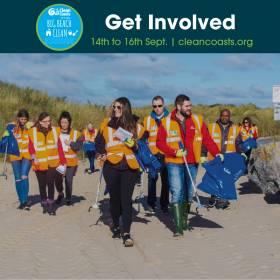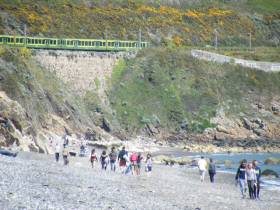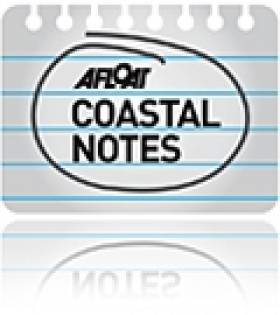Displaying items by tag: Big Beach Clean
Clean Coasts Volunteers Removed 46 Tonnes of Litter as Part of its 'Big Beach Clean'
7,700 Clean Coasts volunteers rolled up their sleeves and removed a staggering 46 tonnes of litter all across the country as part of the Big Beach Clean.
The Big Beach Clean is part of the International Coastal Cleanup (ICC) organised by the Ocean Conservancy, and it entails an annual call-to-action for individuals, families, and communities to join forces to carry out a clean-up at the end of the bathing season and join a worldwide citizen science project.
The Big Beach Clean flagship event took place on Thursday, 28th September, from 10:30 am-12:30 pm in Youghal at Redbarn Beach, in Cork, to wrap up the initiative.
The event marked the end of a successful and busy summer for Clean Coasts volunteers, as well as a celebration of Sustainable Development Goals Week. Among the participants, there were several schools, including 4th class Gaelscoil Chorain, Youghal and Glamire Community College from the city suburbs. Glanmire Community College were eager to collect data about cigarette and vape litter for their BT Young Scientist project.
During the event, volunteers collected an additional 260.5kg of litter, including a couch and door. In addition to the usual litter items, such as cigarette butts and plastic items, volunteers found a Teddy bear and fishing gear.
Youghal had been badly hit by Storm Agnes, with a roof blowing off a building on Front Strand.
This year's Big Beach Clean was also part of Clean Coast's 20th anniversary celebrations, and the charity programme was delighted to see volunteers from all walks of life, including community groups, Tidy Towns associations, students, families, local businesses, and environmental enthusiasts, unite with a shared commitment to tackle marine litter.
Clean Coasts 'Big Beach Clean' Begins Tomorrow And Weekend of 15th-16th September
#MarineWildlife - Clean Coasts 'Big Beach Clean' returns to Ireland in 2018 beginning tomorrow, with the volunteer effort continuing throughout this weekend of 15th-16th September.
So join in and take positive action by raising awareness of the massive damage caused by marine litter pollution on the natural world. This can be done by registering online as a Clean Coast group or why not organise your own event with family and friends.
Once again Clean Coasts, An Taisce's Environmental Education Unit, is teaming up with the Ocean Conservancy for the International Coastal Cleanup event.
Clean Coasts in 2018 is to continue the growth and success of last year's Big Beach Clean, by increasing the number of beach cleans along the Irish coastline. In addition it is their aim to increase the amount of marine litter data collection.
As with previous years, Clean Coasts beach clean packs will contain marine litter data collection cards. This year they will also be encouraging their groups to use the Clean Swell App by Ocean Conservancy and will add a marine data portal to the Clean Coasts website. This will make it easier for volunteers to submit data collected on the beach cleans.
According to Clean Coasts, last year the international event involved 789,138 volunteers taking part from more than 100 countries. Collectively they accumulated nearly 20.5 million pounds (or 9.3 million kilograms) of marine litter.
As in previous years, among the principle litter culprits, cigarette butts—which contain plastic filters—topped the list at approximately 2.4 million collected. This category was followed by food wrappers (1.7 million), plastic beverage bottles (1.6 million), plastic bottle caps (1.1 million), and plastic grocery bags (757,523) rounding out the top five.
Clean Coast encourages everyone to enjoy being part of the movement for litter free seas in addition to being part of the world’s largest coastal cleanup event. Also for those participating in the marine litter survey.
For further information on Clean Coast, the Big Beach Clean and much more visit their website here.
The Big Beach Clean Next Weekend (15-17 Sept): Take Part And Make A Positive Difference!
#BigBeachClean - Clean Coasts Big Beach Clean returns this year when the event takes place next weekend (15-17 September). So there's still time to register your pariticpation to make a positive difference in helping the environment.
Clean Coasts engages communities in the protection of Ireland’s beaches, seas and marine life. The programme is operated by the Environmental Education Unit of An Taisce which is funded by the Department of Environment. Once again the Clean Coasts Big Beach Clean team have signed up with the International Ocean Conservancy for the International Coastal Cleanup event.
Nearly 800,000 volunteers from over 90 countries in 2016 removed 8,193 tonnes of marine litter from the world’s oceans. It is hoped that everyone will join the movement for litter free seas!
The stark reality is that around a staggering 10 million tonnes of litter end up in the world’s oceans annually which causes destruction that can be devestating to both plants and marine life.
So what is the problem of “marine litter” -firstly the term covers a wide range of materials which have been deliberately discarded, or accidentally lost on shore or at sea. In addition to materials carried out to sea from land, rivers, drainage and sewerage systems, or the wind (European Commission, 2013).
By getting involved in the Clean Coasts movement for litter free seas, you can be part of the world’s largest coastal cleanup event and marine litter survey. Help the coastline you love by taking part in Clean Coasts Big Beach Clean to protect our beaches, seas and marine life locally, nationally and internationally.
Free clean-up kits are available (while stocks last!) which include gloves, bags, data collection cards, posters and high-vis vests are available while stocks last. Sign up online below or call Clean Coasts on 01 400 2210.
It's so simple to take part in the Big Beach Clean be it individually, with friends and family in addition to groups.
So get registering your group type now!... it's only a click away for your own beach cleaning event!
To register online click here and for information that includes links to some useful resources you will need for your clean-up:
Join The World’s Largest Coastal Cleanup This Weekend
#BigBeachClean - Clean Coasts’ Big Beach Clean is happening this weekend 20-21 September. And once again Clean Coasts is teaming up with the International Ocean Conservancy for the International Coastal Cleanup event.
Last year 645,015 volunteers in nine countries removed 5,580 tonnes of marine litter from the world's oceans. This year’s Big Beach Clean aims to be the biggest yet, with 100 cleanups taking place (find a cleanup near you or register a beach to clean up at www.bigbeachclean.ie).
During the Big Beach Clean, Clean Coasts volunteers are asked to carry out marine litter surveys to quantify the amount and types of marine litter on Irish beaches. These surveys are aimed at heightening awareness about the issue of marine litter and serve as an indicator of the magnitude of the problem.
Speaking about the Big Beach Clean, Clean Coasts national manager Annabel FitzGerald said: “Marine litter is a global concern, affecting all the oceans of the world. Every year, millions of tonnes of litter end up in our seas and oceans, posing environmental, economic, health and aesthetic challenges.
"Ireland boasts spectacular sandy beaches and rocky shores and we all have a responsibility in caring for it. Every single piece of litter removed during the Big Beach Clean is one less piece of litter that will pollute our beautiful beaches or harm wildlife.”
Clean Coasts ambassador Easkey Britton also spoke about her support of the Big Beach Clean. “The ocean is important - our personal health and wellbeing is so interconnected with the health of our coasts and ocean but it's in trouble," she said.
"Marine litter is a big issue but each one of us has the power to do something about it and make a real impact for our health and the ocean's. Take action now and register for the Big Beach Clean!”































































